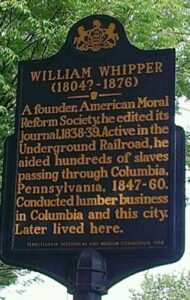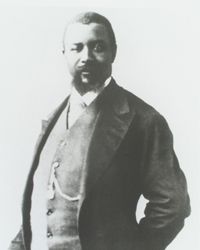
William Whipper was an African-American abolitionist. Whipper was a successful businessman who played a key role in the antislavery movement as a reformer. He advocated nonviolence and co-founded the American Moral Reform Society, an early African-American abolitionist organization. William Whipper epitomized the unique prosperity that Northern Blacks were able to attain in the mid-19th century, he died March 9, 1876.
-Born February 22, 1804 in Drumore Township, Lancaster County, Pennsylvania to an enslaved African-American house servant,and her white owner. William had siblings, Alfred, Benjamin, Hannah wife of Stephen Purnell and Mary Ann wife of James Burns Hollensworth.
-After moving to Philadelphia in the 1820s, he began focusing his energies on his business pursuits. In 1834 he opened a free labor and temperance grocery store. His support of the temperance movement was motivated by liquor’s destructive effect on Africa and the belief that alcohol consumption was a contributing factor for Africans selling their own people into slavery. In conjunction with his support for the temperance movement, Whipper began actively participating in the antislavery movement as well.
-In 1835 Whipper relocated to Columbia, Pennsylvania, with fellow black entrepreneur Stephen Smith. The pair created one of the state’s premier lumberyards and accrued substantial wealth demonstrating the benefits of northern freedom.
-Whipper used his newfound wealth to further his personal fight for moral reform and abolition. He utilized his assets to the benefit of the antislavery movement by helping runaway slaves escape to the north. He was also involved in the Philomatheon Institute of Philadelphia, a literary organization which included Frederick Douglass, Charles Burleigh Purvis, Mifflin Wistar Gibbs, and Izaiah Weir.
-His sister Mary Ann married James Hollensworth and settled in Dresden, Ontario, Canada, a final destination on the Underground Railroad. Mary Ann and James were the overseers of William Whipper’s investments in Dresden. William Whipper operated a major Underground Railroad station and provided shelter for slaves primarily from Virginia and Maryland, moving them in part in the railroad cars he owned.
-1863 Broadside listing Whipper as a speaker calling men of color to arms. Whipper’s ideology regarding antislavery was unique and complex. One of his main tenets rested in moral reform. Moral reform refers to the idea that the abolitionist movement “served as a check on the evil dispositions of blacks and inculcated moral principles.
-Initially Whipper believed that white prejudice against Black Americans stemmed from the condition in which blacks found themselves, not just the color of their skin. In order to overcome their condition, Whipper stipulated that “blacks had to improve their mental, economic, and moral situations. By making such improvements, blacks would seemingly conform to white standards of living, making social acceptance more attainable.
-Another key component of Whipper’s ideology was rooted in idea of nonviolence and rational persuasion. At the age of 24, Whipper published his famous essay “An Address on Non-Resistance to Offensive Aggression”. This address suggested that nonviolent means of moral righteousness were necessary to encourage a peaceful political movement towards change. This address has been a considered a precursor to what would become some of the same nonviolent strategies followed during later civil rights movements.
-Furthermore, Whipper demonstrated his dedication to the notion of moral reform via the creation of the American Moral Reform Society. In 1835 he attended the annual convention of the Improvement of Free People of Color. He urged delegates to adopt a resolution, which ended the usage of the word “colored”. Because of his persistence, the delegates decided to organize a society that would have no racial boundaries. The convention gave birth to the American Moral Reform Society, and gave Whipper credit as a founding father. The American Moral Reform Society attempted to promote general aims such as educating blacks, establishing a black press, and printing histories of the blacks.
-In the late 1850s and early 1860s, Whipper worked with George DeBaptiste to purchase a steamboat, the T. Whitney, which shipped lumber and escaping slaves between Sandusky, Ohio, Detroit, Michigan, and Amherstburg, Ontario. The ship was managed in part by Samuel C. Watson.




